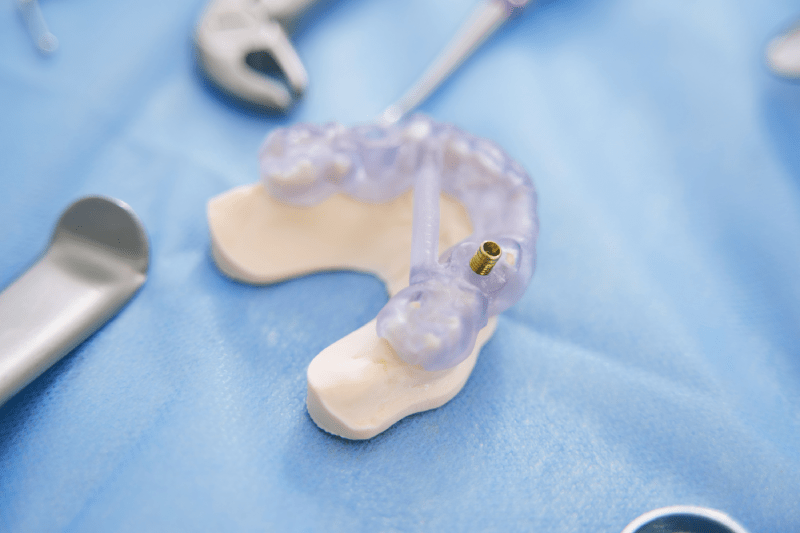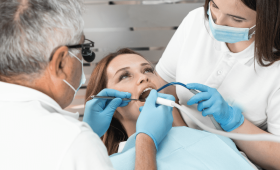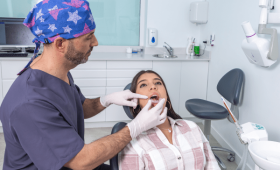Is Pain Felt During Dental Crown Application?
Dental crown application is one of the most frequently wondered topics by patients and is generally a painless procedure. Your dentist applies a local anesthetic to the relevant area before starting the treatment.
This ensures that you do not feel any pain or discomfort during all stages, such as tooth preparation, shaping, and impression taking. The effect of the anesthetic lasts until the procedure is completed, making the process extremely comfortable for you. Dentists prioritize patient comfort and are careful to use the most minimally invasive methods. If you feel even the slightest sensitivity during the procedure, it is enough to inform your dentist; this can be immediately resolved with additional anesthesia.
Does Local Anesthesia Application Hurt?
The local anesthesia injection can be one of the most sensitive steps of the dental crown procedure, but this has also been minimized in modern dentistry. Before the injection, a numbing gel is applied to the area to be treated, reducing the pain felt to almost zero.
The anesthesia itself only creates a brief, slight stinging sensation. This sting allows for all subsequent procedures to be performed completely pain-free by ensuring the tooth and surrounding tissues are fully numb. So, this brief discomfort ensures you remain comfortable throughout the entire treatment. There is no need to worry about this.
Is The Tooth Preparation Stage Painful?
Tooth preparation is the stage where the tooth is reduced in size so the crown can fit perfectly. This stage is completely painless thanks to local anesthesia. Since your tooth nerves are numbed, even if you feel your tooth being touched or ground down, you will not feel any pain or ache.
Your dentist carefully and controllably prepares your tooth to create the most accurate crown shape. This process is of critical importance to ensure the crown is long-lasting and aesthetic. It is important to inform your dentist if you feel any abnormal sensation or pressure during the procedure.
Is The Temporary Crown Placement Procedure Painful?
While your permanent crown is being prepared in the lab, a temporary crown is placed to protect your tooth and provide an aesthetic appearance. This procedure is also painless and usually takes a very short time. The temporary crown protects the sensitive tooth tissue, prevents hot and cold sensitivity, and helps you maintain your chewing function. Since the temporary crown is not fixed as strongly as the permanent adhesive, it must be used carefully. No pain is felt during the placement procedure.
What Pains Are Normal After A Dental Crown?
It is quite normal to experience a slight pain or sensitivity for the first few days after a dental crown application. This is due to the tooth being worked on and adapting to the new crown. You may feel sensitivity, especially when chewing or consuming hot or cold food and drinks. This sensitivity usually decreases on its own within a few days and disappears completely. If the pain is severe or lasts longer than a week, it may indicate that there is a problem with the crown’s height or another issue with the underlying tooth. In such a case, you should consult your dentist.
Does Dental Crown Application Affect My Oral Health?
A properly applied dental crown provides positive contributions to your oral health. It restores a damaged tooth, protecting it from further decay and fractures. The crown restores the original form of your tooth, improving your chewing function and the alignment of your teeth. Furthermore, it prevents teeth from shifting by closing the missing tooth gaps. On the other hand, an improperly applied crown or insufficient oral hygiene can lead to problems like gum inflammation. Therefore, a quality treatment and regular care afterward are of vital importance.
Can A Dental Crown Cause Headaches?
A dental crown can, albeit rarely, cause headaches, but this condition is usually due to the crown being misaligned or creating an imbalance in your chewing pattern. If your new crown is higher than normal, it can put unnecessary pressure on the jaw joints, leading to pain and headaches. To solve this problem, your dentist can adjust the crown’s height with a simple procedure. After a correct fit is achieved, these types of pains disappear completely. For your jaw health, you must ensure your crown is placed correctly.
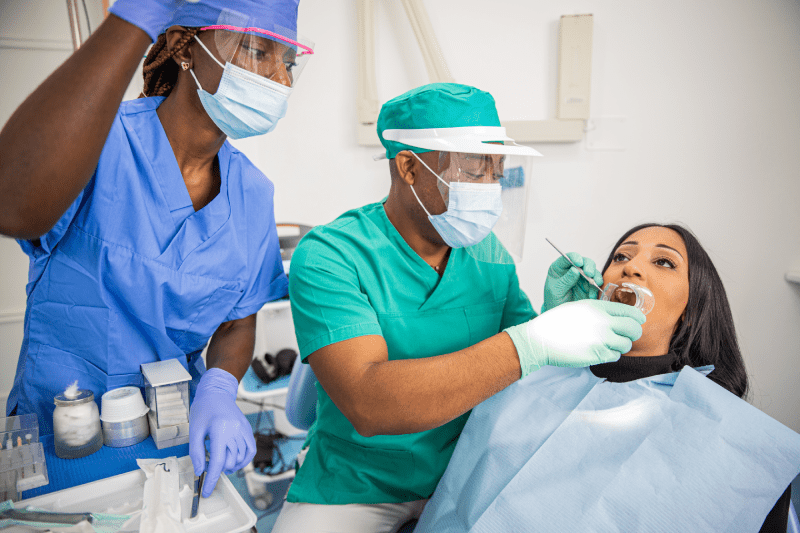
Can A Dental Crown Cause Jaw Pain?
In the case of a dental crown being misaligned or disrupting the chewing balance, it can lead to pain in the jaw joints. Especially if the crown is higher than normal, it can alter the force applied to your other teeth when chewing, which can cause fatigue and pain in the jaw muscles. To prevent this, your dentist carefully checks the height of the crown after it is placed. If you feel any discomfort, informing your dentist ensures that the crown is quickly adjusted and jaw pain is prevented.
How Long Does Sensitivity Last After A Dental Crown?
The sensitivity that may be experienced after a dental crown varies depending on the condition of the tooth and individual differences. Generally, this sensitivity decreases and disappears within the first few days. However, if the sensitivity lasts longer than a week, it may indicate a problem under the crown, such as nerve inflammation or insufficient insulation. The reason for this could be that the underlying tooth has not undergone a root canal treatment or the gum line was not sufficiently protected. In such a case, it is best to consult your dentist.
Can Getting A Dental Crown Cause Jaw Joint Disorder?
A dental crown can, albeit rarely, cause a temporomandibular joint disorder (TMD) because it can affect the balance of the chewing pattern. If a crown is not made correctly and is not in harmony with other teeth, this can put extra pressure on the jaw joint, leading to pain and dysfunction. However, a crown meticulously prepared and placed by a specialist dentist maintains the chewing balance and can even help to resolve existing TMD issues. Therefore, choosing an experienced dentist is very important.
What Are The Causes of Pain After A Dental Crown?
There can be several possible causes of pain after a dental crown. The most common cause is the sensitivity that occurs during the preparation of the tooth. This sensitivity can be seen when the procedure is done near the tooth nerve. Another reason is that the crown is too high, which causes pain by creating pressure when chewing. Additionally, a leak from the edges of the crown and decay of the underlying tooth can also cause pain. Although rare, the nerve of the tooth under the crown can become inflamed, which leads to severe pain. In this case, a root canal treatment may be necessary.
Does The Habit of Teeth Grinding Increase Crown Pain?
Yes, the habit of teeth grinding or clenching (bruxism) can cause serious damage to both natural teeth and crowns and can increase pain. This habit applies much more pressure than normal to the crown, which can lead to it cracking or breaking. It also tires the chewing muscles and the jaw joint, causing pain. Bruxism treatment is usually done with the use of a night guard, and this guard protects your crowns. If you have such a habit, it is of vital importance to consult your dentist about this before or after getting a crown.
Is Tooth Trimming Really Necessary For Dental Crown Application?
The trimming of the tooth for dental crown application is necessary for the crown to fit perfectly on the tooth. A very thin layer is removed from around the tooth to make room for the crown. This stage ensures that the crown gains a natural and smooth appearance, is in line with the other teeth, and does not cause discomfort in the mouth. It should be remembered that since this procedure is done under local anesthesia, no pain is felt, and it is a necessary step to protect the tooth’s integrity. The dental crown takes the damaged part of the tooth under protection.
What Medications Can Be Used After A Dental Crown?
For any slight pain or discomfort that may be experienced after a dental crown application, you can use over-the-counter painkillers recommended by your dentist. Generally, medications containing ibuprofen or paracetamol will suffice. If your dentist has prescribed an antibiotic, it is important to use it in the specified dose and duration. The use of medication helps prevent a possible infection or relieve pain. However, you must consult your dentist before using any medication.
How Long Does The Dental Crown Procedure Take?
The dental crown procedure is usually completed in two or three appointments. In the first appointment, steps such as tooth preparation and impression taking are carried out, which can take about an hour. These impressions are used for the preparation of the crown in the lab, and this process can take a few days or a week. In the last appointment, the permanent crown is placed on the tooth. The entire process varies depending on the condition of your tooth and the lab’s working time.
How Safe Is A Temporary Crown?
A temporary crown is designed to protect your tooth until the permanent crown arrives. Since it is fixed to your tooth with a less strong adhesive, it is necessary to avoid very hard and sticky foods. The purpose of the temporary crown is to prevent sensitivity and provide an aesthetic appearance. This crown protects the health of your tooth during the period until the permanent crown arrives. If your temporary crown comes off, you should consult your dentist immediately.
Is Bleeding Normal After A Dental Crown?
Slight bleeding from the gums can be seen after a dental crown is placed, which is generally normal. This is due to the gums being slightly irritated during the procedure. The bleeding usually stops on its own within a few hours. If the bleeding continues for a long time or becomes severe, it may indicate that the crown is not fitting properly at the gum line. In this case, you should consult your dentist. A correctly fitting crown should not irritate the gums.
What Is Felt After A Dental Crown Is Placed?
For the first few days after a dental crown is placed, you may experience a slight feeling of pressure, sensitivity, or an adjustment period on your tooth. These sensations are caused by your tooth trying to adapt to the new crown. It is normal to feel a slight oddity, especially on the first day the crown is placed. These sensations decrease over time, and the crown begins to feel like a part of your natural tooth. If these sensations last for a long time, you should consult your dentist.
Does The Quality of The Dental Crown Affect Pain?
Yes, the quality of the dental crown directly affects the level of pain and discomfort that may be experienced after treatment. Crowns made from high-quality materials and designed correctly provide a perfect fit for the tooth. This prevents bacteria from leaking from the edges of the crown and prevents the underlying tooth from decaying. A low-quality or incorrectly sized crown, on the other hand, can irritate the gums, disrupt the chewing pattern, and cause pain. Therefore, the selection of quality materials and a specialist dentist is of vital importance.
Does Gum Recession Cause Pain Under The Crown?
If gum recession occurs in a crowned tooth, the edge of the crown becomes exposed, and the root surface of the underlying tooth becomes sensitive. This can lead to sensitivity and pain against hot, cold, or sweet foods. Gum recession usually occurs due to poor oral hygiene or gum disease. To prevent this, regular oral hygiene and periodic dental check-ups are very important.
Why Does Jaw Muscle Fatigue Occur After A Dental Crown?
A new dental crown can cause small changes in your chewing pattern. If the crown is a little higher than normal, it can change the force applied when closing your jaw. This can lead to fatigue and pain in the jaw muscles. Your dentist checks this after the crown is placed and makes the necessary adjustments. With a correct alignment, this feeling of fatigue disappears completely, and your chewing function returns to normal.
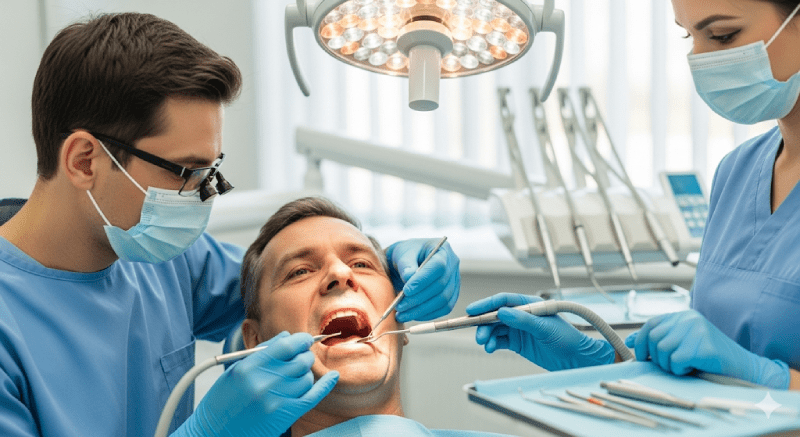
Is Cold And Hot Sensitivity Normal After A Dental Crown?
It is quite normal to experience cold and hot sensitivity in the teeth after a dental crown. The reason for this is that the outer layer of the tooth (enamel) is thinned for the crown. This thinning makes the underlying dentin layer more sensitive. This sensitivity is usually temporary and decreases as the tooth adapts to the crown. The sensitivity disappears completely within a few weeks. You can use sensitivity-reducing toothpaste during this process.
Does Decay In The Tooth Under The Crown Cause Pain?
Yes, decay in the tooth under the dental crown can cause severe pain. This condition usually occurs as a result of the crown’s edges not fitting completely to the tooth and bacteria leaking in. As the decay progresses, it gets closer to the tooth’s nerve, causing pain. If you feel this kind of pain, you should consult your dentist immediately. The crown may need to be removed, the decay cleaned out, and a new crown made afterward.
Which Teeth Are Suitable For Dental Crowns?
Dental crowns can be applied to any tooth that has been damaged by decay, fracture, or misshapen form. They are often preferred to prevent the fracture of teeth that have undergone root canal treatment. Additionally, crowns are made for teeth that have suffered too much damage to be saved with a filling, and for structures placed on top of implants. Your dentist will evaluate the condition of your tooth and determine the most suitable treatment plan.
Does Getting A Dental Crown Have An Age Limit?
There is no specific age limit for dental crown treatment. Generally, it can be applied to individuals of all ages whose tooth development is complete. It is an ideal solution, especially for adults with aesthetic or functional problems. However, in children in the developmental stage, temporary solutions may be preferred instead of crowns due to constantly changing teeth.
What Should I Do If I Have Other Questions About Dental Crown Treatment?
For any questions you may have about dental crown treatment, Cure Holiday specialists are always ready to assist you. You can contact Cure Holiday to get the most accurate information, create a personalized treatment plan, and clear up all your questions. We are here to create a personalized dental crown plan for you.
Is The Sensitivity After A Dental Crown Temporary?
Yes, the sensitivity that occurs after a dental crown is largely temporary. It may take a few days for the tooth to adapt to the crown and for the underlying nerve to recover. This sensitivity is usually felt during chewing or with hot/cold contact. If this sensitivity lasts longer than a week, it may indicate a problem at the edges or under the crown. A dentist should be consulted to resolve this issue.
Why Does A Dental Crown Cause Pain?
There can be various reasons why a dental crown causes pain. The most common reasons are the crown being too high, decay in the underlying tooth, or inflammation of the nerve. A crown that is too high increases chewing pressure, causing pain. Due to insufficient hygiene, the tooth under the crown can decay, which also leads to pain. In rare cases, the tooth’s nerve can become inflamed, which causes severe pain. In these situations, the crown may need to be removed, and the underlying problem needs to be resolved.
How Is Chewing Function Affected After A Dental Crown?
A dental crown aims to completely restore the chewing function of a missing or damaged tooth. For the first few days, it may take some time to get used to the new crown, and you may feel a difference in chewing sensation. However, a properly placed crown normalizes and even improves your chewing pattern. This also provides positive contributions to your digestive health. If you feel any discomfort while chewing, you should consult your dentist to have your crown adjusted.
How To Protect Gum Health After A Dental Crown?
Protecting gum health after a dental crown is of vital importance for the crown’s longevity. Plaque and food debris that accumulate at the edges of the crown can lead to gum inflammation and recession. To prevent this, you should brush your teeth at least twice a day, use dental floss, and especially clean the crown edges well. Your dentist will show you the most suitable care methods for your gum health.
What Preparations Should Be Made Before A Dental Crown Application?
Before a dental crown application, your dentist will evaluate your oral and dental health in detail. If necessary, decay is cleaned out, and additional treatments such as root canal treatment are performed. This ensures that the tooth to be crowned is healthy and will be long-lasting. Your dentist will also talk to you about the color and shape of the crown to understand your expectations.
What Foods Should Be Avoided After A Dental Crown?
After a dental crown, especially in the first few days, it is important to avoid very hard or sticky foods. Such foods can cause the temporary crown to come off or damage the permanent crown. Avoiding foods like nuts, hard candies, and caramel protects the crown’s health.
Is A Difference Felt Between A Dental Crown And Other Teeth?
A correctly made dental crown will be at the same level and the same size as your other teeth, so you will not feel any difference. Your dentist meticulously adjusts the size and shape of the crown to ensure chewing function and aesthetic appearance. In this way, the crown feels completely natural in your mouth.
What Steps Are Followed For Dental Crown Treatment?
Dental crown treatment begins with the examination of the tooth. Then the dentist prepares the tooth and takes an impression. This impression is sent to the lab to produce a custom-made crown. A temporary crown is placed during this process. Finally, the permanent crown is cemented to the tooth, and final checks are made. These steps ensure that the crown is long-lasting and successful.
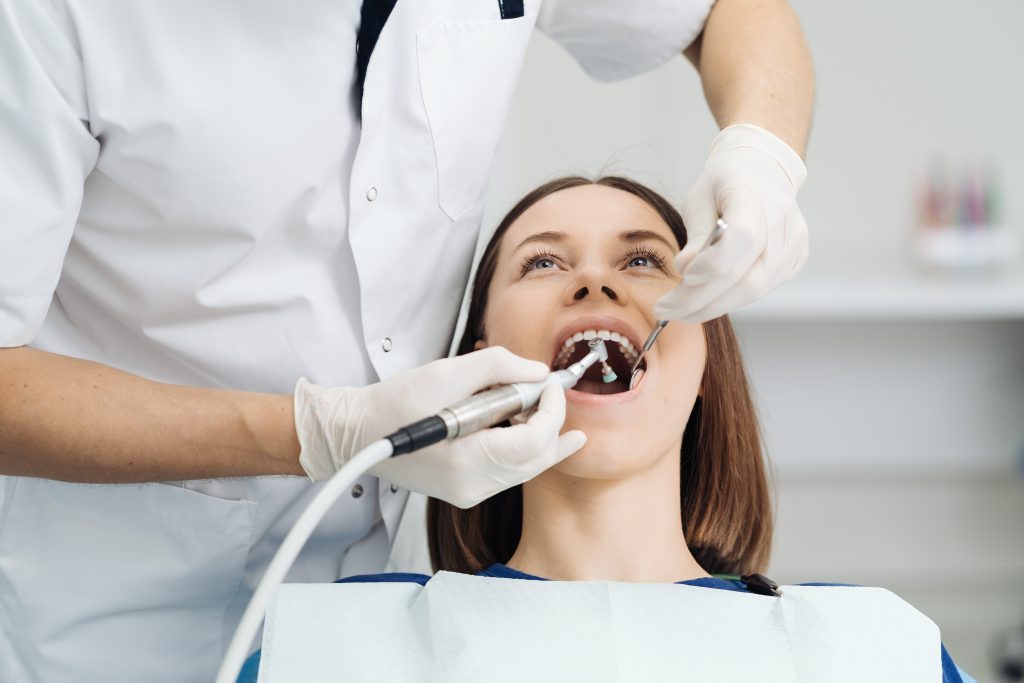
Why Should I Choose Cure Holiday For Dental Crown Treatment?
Cure Holiday brings together modern technologies and expert dentists to offer you the best dental crown treatment. With its transparent pricing policy and personalized treatment plans, it makes your dental treatment experience in Turkey comfortable and reliable. You can choose Cure Holiday to have a healthy and aesthetic smile.
How Do I Choose The Right Dentist For A Dental Crown?
Choosing the right dentist for a dental crown is of critical importance for the success of the treatment. You should choose a dentist who is experienced, has references, and uses modern technologies. It is also important that the dentist communicates with you, understands your expectations, and provides you with detailed information about the entire process. Cure Holiday works with expert dentists who meet these criteria.
Is Swelling Normal After A Dental Crown?
It is normal to see a slight swelling or redness after a dental crown application, but this condition usually subsides within one or two days. The swelling is due to the gums being slightly irritated during the procedure. If the swelling increases or is accompanied by severe pain, it may be a sign of an infection. In this case, you should consult your dentist. A cold compress can help reduce the swelling.
Is It Necessary To Use Painkillers During Dental Crown Treatment?
Since local anesthesia is used during dental crown treatment, there is no need to use painkillers. However, for any slight pain or sensitivity that may be experienced after the procedure, you can use over-the-counter painkillers recommended by your dentist. If the pain continues despite using painkillers, it may be a sign of a problem, and you should consult your dentist.
